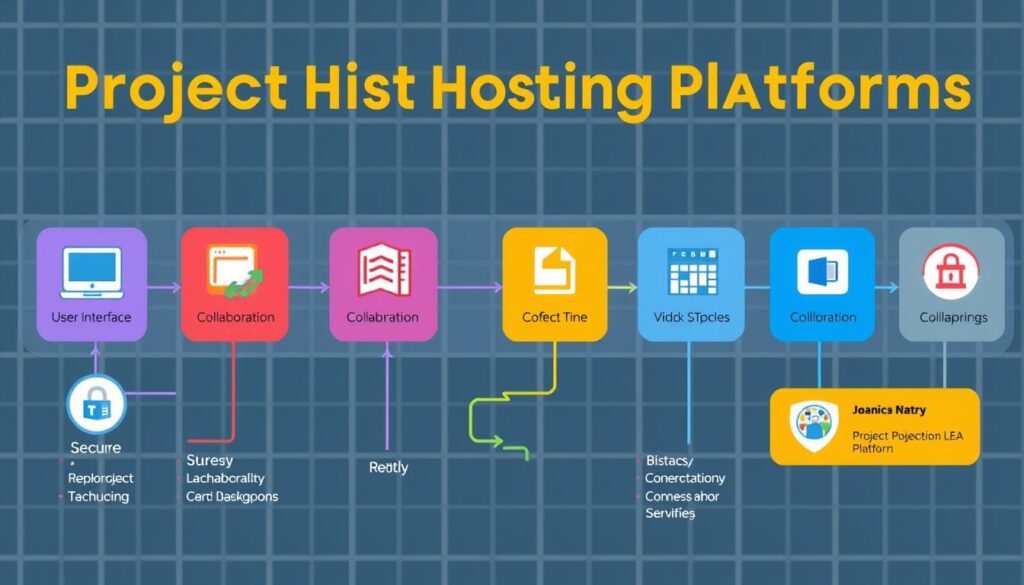Sourceforge Alternative
Open-source project management requires secure, user-friendly platforms for hosting and sharing code. Developers seek Sourceforge alternatives with better features and collaboration tools. These platforms offer enhanced flexibility for managing projects.
The search for top-notch open-source project management tools has led to various code hosting platforms. These range from industry leaders to innovative newcomers. Each platform offers unique benefits to developers and project managers.
Let’s explore Sourceforge alternatives and their key features. We’ll examine what sets these platforms apart. This information will help organizations choose the right tools for their open-source projects.
| Platform | Key Features | Pricing | Target Audience |
|---|---|---|---|
| GitHub |
| Free for public repositories, paid plans for private repositories and advanced features | Developers, open-source contributors, and organizations |
| GitLab |
| Free Community Edition, paid plans for advanced features and enterprise-level support | Developers, DevOps teams, and organizations |
The Sourceforge alternatives market is growing rapidly. New options are emerging to meet diverse project management needs. Developers and organizations now have more choices for effective project management.
Powerful Open-Source Platforms to Consider
Open-source platforms have become strong alternatives to traditional code hosting solutions. GitHub and GitLab lead the industry. They offer comprehensive features for developers and project teams.
These platforms meet diverse needs in software development. They provide tools for collaboration, version control, and project management.
GitHub: The Industry-Leading Git Repository
GitHub is the top choice for developers seeking a robust Git repository. Its user-friendly interface integrates seamlessly with popular development tools.
A thriving community of contributors makes GitHub the standard for open-source projects. It offers version control, issue tracking, and code review features.
Developers worldwide prefer GitHub as a github as sourceforge alternative. It provides a streamlined workflow for efficient project management.
GitLab: A Versatile Alternative for DevOps
GitLab offers a comprehensive solution for the entire software development lifecycle. It serves as a strong gitlab sourceforge replacement for organizations embracing DevOps.
This all-in-one platform integrates version control, continuous integration, and deployment. It also includes issue tracking and other essential features.
GitLab’s flexibility makes it popular among enterprises and open-source code hosting platforms. It provides a central hub for collaboration and automation.
“GitHub and GitLab have transformed the way developers collaborate and manage their projects, setting new standards for open-source code hosting and project management.”
Sourceforge Alternative: Cloud-Based Solutions
Cloud-based platforms offer a compelling alternative to traditional on-premises software development tools. AWS CodeCommit stands out among cloud-based Sourceforge alternatives. It’s a robust, Git-based solution that integrates with the Amazon Web Services ecosystem.
AWS CodeCommit: Amazon’s Git-Based Solution
AWS CodeCommit is Amazon’s fully managed cloud-based sourceforge alternative. It provides a secure and scalable Git-based repository for developers. Teams can collaborate, track changes, and manage code versions easily within the Git workflow.
A key advantage of AWS CodeCommit is its integration with other AWS services. This allows developers to harness cloud power for their software needs. It offers seamless deployment, reliable backup, and disaster recovery options.
AWS CodeCommit boasts enterprise-grade security features to protect sensitive code. It includes advanced access controls, encryption, and audit logging. These ensure codebase security and compliance with industry standards.
Using cloud-based sourceforge alternatives like AWS CodeCommit offers many benefits. Development teams can enjoy scalability, reliability, and easy integration. This drives projects forward with greater efficiency and confidence.

Self-Hosted Sourceforge Alternatives
Self-hosted solutions give organizations more control over their development infrastructure. Gogs is a standout option for teams looking for on-premises code management. It’s lightweight, efficient, and meets the needs of many organizations.
Gogs: A Lightweight and Efficient Option
Gogs is an open-source self-hosted sourceforge alternative. It’s a Git server that’s simple, fast, and lightweight. Teams can host code repositories on their own servers with Gogs.
Gogs stands out for its simplicity. Its clean interface makes managing code and collaborating easy. The small footprint and efficient resource use make it great for organizations with limited IT resources.
Gogs’ gogs open-source git server features include:
- User and organization management
- Integrated issue tracking
- Pull request functionality
- Webhook support for integration with other tools
- Customizable themes and branding
Gogs is powerful and easy to manage. It’s popular among teams who want control over their code repositories. The flexibility and scalability of Gogs make it a top self-hosted sourceforge alternative.
Comparing Sourceforge Alternatives: Key Features
Choosing a Sourceforge alternative requires careful consideration of each platform’s features. This analysis will help you compare project hosting solutions. You’ll be able to make an informed decision based on your needs.
Functionality Comparison
GitHub, GitLab, and AWS CodeCommit offer various features for project management. These include version control systems, collaborative coding environments, and issue tracking. They also integrate seamlessly with development tools.
| Feature | GitHub | GitLab | AWS CodeCommit |
|---|---|---|---|
| Version Control | Git | Git | Git |
| Issue Tracking | ✓ | ✓ | ✓ |
| Code Review | ✓ | ✓ | ✓ |
| CI/CD Pipelines | ✓ | ✓ | ✓ |
| Project Management | ✓ | ✓ | ✓ |
This comparison showcases key features of leading project hosting platforms. It provides a helpful starting point for evaluating features of Sourceforge alternatives. You can use this to begin your functionality comparison.

Factors to Consider When Choosing a Sourceforge Alternative
Selecting a Sourceforge alternative requires careful thought. Key factors can impact your project’s success. These include community support and tool integration.
Community Support and Documentation
A robust community and quality documentation are vital. They offer invaluable assistance and shared knowledge. Comprehensive guides can streamline onboarding and help navigate the platform easily.
Integration with Development Tools
Seamless integration with your current tools boosts productivity. Look for platforms that work well with popular IDEs and CI systems. This creates an efficient development ecosystem.
| Factors to Consider | Description |
|---|---|
| Community Support and Documentation | Evaluate the strength of the community, the availability of user guides, tutorials, and troubleshooting resources. |
| Integration with Development Tools | Assess the platform’s compatibility and integration capabilities with the tools and software you currently use. |
Consider these factors to make an informed decision. Choose a Sourceforge alternative that fits your project’s needs. This ensures a smooth and efficient development process.
“Choosing the right Sourceforge alternative can significantly impact the success of your project. Prioritize community support, documentation, and integration with your existing development tools for the best results.”
Migration Strategies from Sourceforge
Moving from Sourceforge to other platforms can be easy with the right approach. This guide will help you transition your projects smoothly. We’ll cover key steps for a successful migration.
Start by evaluating your current Sourceforge setup. Look at your projects, data, and any connected systems. This will help you choose the best migration method.
Here’s what to do next:
- Identify the key components of your Sourceforge projects, including source code, issue tracking, documentation, and any other associated data.
- Research and evaluate the alternative platforms that best fit your requirements, taking into account features, community support, and integration capabilities.
- Develop a detailed migration plan that outlines the steps and timelines for transferring your projects and data to the new platform.
With a solid plan, you can start the migration process. This may involve several steps:
- Exporting your code repositories from Sourceforge and importing them into the new platform, preserving commit history and metadata.
- Transferring issue tracking data, user accounts, and other relevant information to ensure a seamless transition for your team and project collaborators.
- Updating any external integrations or dependencies to reflect the new platform’s URLs and access points.
Keep your team and stakeholders informed during the migration. Update them regularly and address any concerns. This helps ensure a smooth transition.
By following these strategies, you can successfully move your projects from Sourceforge. This will keep your development and teamwork running smoothly.
Sourceforge Alternative: Emerging Trends and Future Outlook
The open-source community is evolving, and so are project hosting platforms. Exciting changes are coming to Sourceforge alternatives. These will reshape how developers work together and manage their projects.
Cloud-based solutions are becoming more important. GitHub and GitLab are leading the way with strong features. Future versions will offer even better cloud integration. This will make it easier for developers to work from anywhere.
Self-hosted alternatives are also on the rise. These options give users more control over their data. Gogs is already popular, and more user-friendly choices are coming soon.
The future holds innovative features and advancements for Sourceforge alternatives. We’ll see better analytics and automated tools. New collaboration features will help developers work more efficiently.
The open-source world keeps growing. Developer needs will shape the future of project hosting. Staying up-to-date with these trends will help drive development forward.
Conclusion
Open-source project hosting has changed a lot since Sourceforge’s heyday. GitHub, GitLab, AWS CodeCommit, and Gogs now offer various features for modern software teams. These platforms cater to different needs and workflows.
Choosing the right Sourceforge alternative requires careful thought. Consider community support, tool integration, and how it fits your team’s workflow. This ensures you pick a platform that empowers your development process.
These insights can guide both new and experienced developers. They’ll help you find the perfect platform for your projects. By using these tools, you can boost collaboration and contribute to the open-source world.

